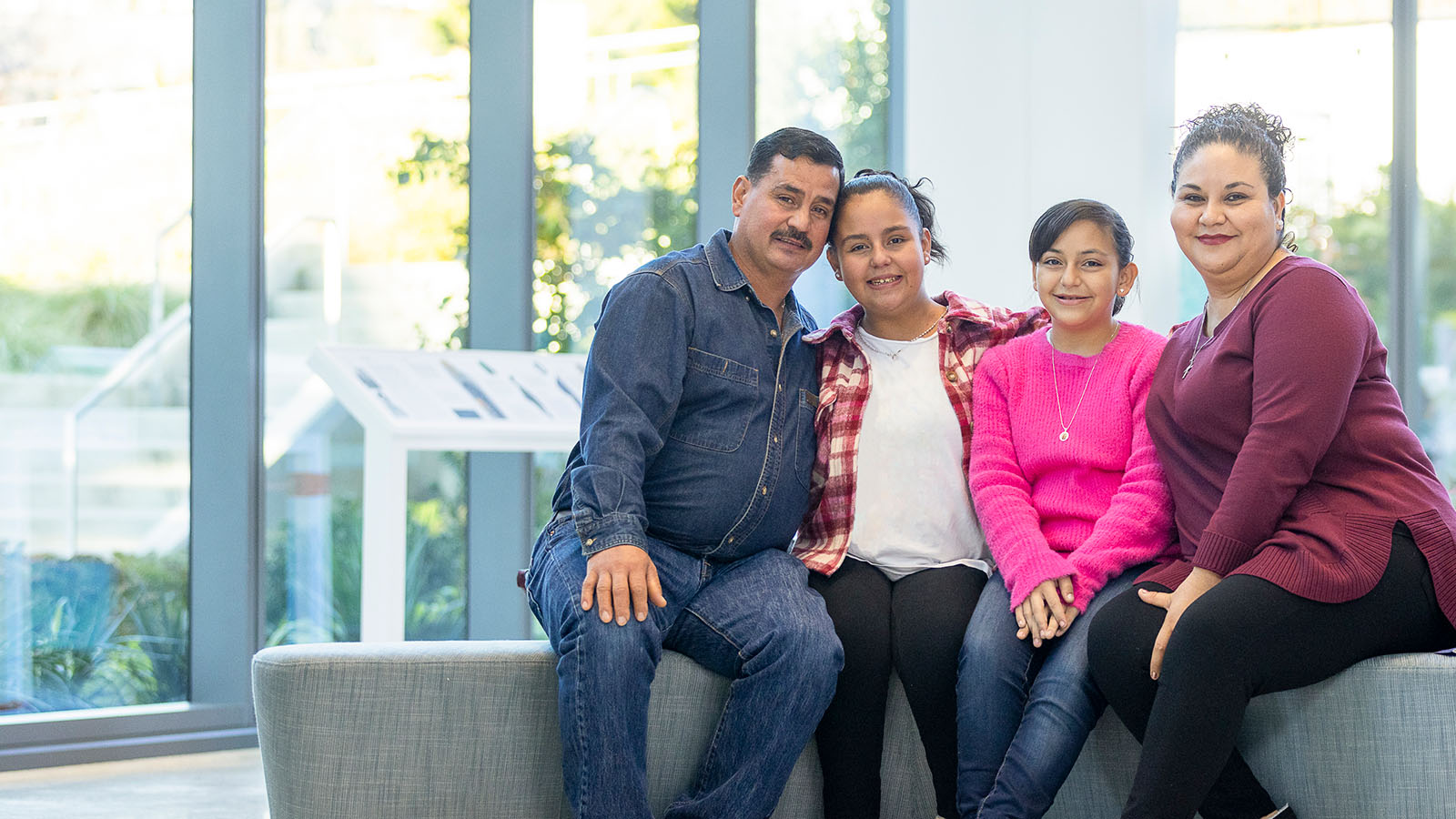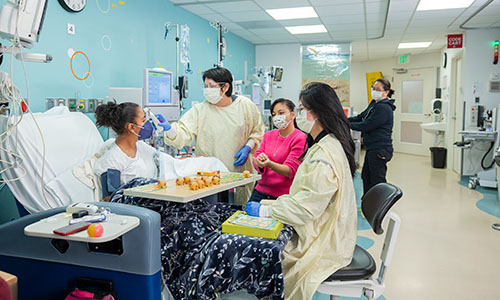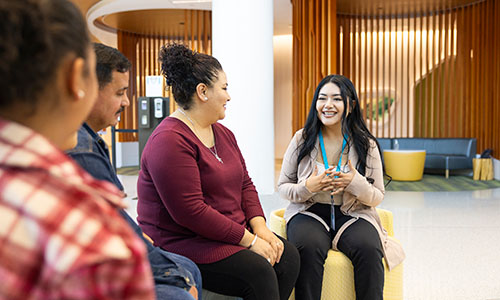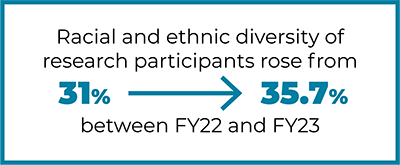
Building Trust With Patients and Families to Improve Racial and Ethnic Diversity in Research
Listen to the Medina-Lamas family interview in Spanish:
Ana and Martin Medina-Lamas came to Seattle Children’s in 2013 hopeful to find the quality healthcare needed for their two daughters, Mary and Monica. Since the age of two, both girls have lived with renal insufficiency, or kidney disease.
Ana and her family relocated to the United States after hearing about Seattle Children’s Nephrology Program 10 years ago. In their home country of Mexico, both girls were on dialysis.
“I have an older sister who was in Seattle at that time. She knew about my situation and investigated how she could help us,” Ana explained*. “My sister helped us get a virtual appointment at Seattle Children’s so my daughters could be seen while we were still in Mexico.”
 Both Mary (far left) and Monica (third from the left) have lived with kidney disease. Mary received dialysis at Seattle Children’s.
Both Mary (far left) and Monica (third from the left) have lived with kidney disease. Mary received dialysis at Seattle Children’s.After making the transition to living in Washington, the Medina-Lamas family immediately sought care for Mary and Monica at Seattle Children’s. Since then, the girls have spent much of their lives visiting the hospital.
“Since I’m going to be 18 soon, I will age out of the hospital in three years,” shared Mary. “I don’t want to leave this hospital – it’s like my second home.”
Monica shares this sentiment.
“I know I need to go to Seattle Children’s for an appointment or for labs, but when I’m at the hospital, I feel happy because I can see new people and I can eat in the cafeteria and it’s fun. They pay a lot of attention to you, and if I have an appointment, I can see my doctor. I love my doctor so much and my nurses. I’m happy to go,” she said*.
The compassionate care that Seattle Children’s has shown to the Medina-Lamas family is one reason that Ana signed her daughters up for several renal research studies. As Spanish speakers, the Medina-Lamas family’s perspective and lived experiences are crucial to improving the accuracy of research findings.
Maria Benitez-Cortez is a bilingual recruitment specialist at Seattle Children’s, a new role added in March 2021 as part of Seattle Children’s Research Integration Hub. She works closely with the Medina-Lamas family and others to make it easier for Spanish-speaking patients to participate in research. Benitez-Cortez and her team’s goal: to increase participant racial and ethnic diversity in research studies to further reflect our patient population. For Benitez-Cortez, this involves enrolling Spanish-speaking participants in studies, keeping the families involved over time and making sure they feel like their voices and opinions matter. It’s a trust-building exercise that is close to her heart.
 Bilingual Research Coordinator Maria Benitez-Cortez (right) works closely with Spanish-speaking families to answer questions and explain benefits of participating in clinical research at Seattle Children’s.
Bilingual Research Coordinator Maria Benitez-Cortez (right) works closely with Spanish-speaking families to answer questions and explain benefits of participating in clinical research at Seattle Children’s.“I’m a Spanish speaker and I grew up in a community that wasn’t really heard. Reading scientific papers, I wouldn’t see Latino communities represented. When I read about medical diseases, there would only be non-Hispanic white populations represented,” Benitez-Cortez shared. “It’s helpful for these participants to see a familiar face. It increases their trust.”
The lack of racial and ethnic diversity among research participants has far-reaching implications. For example, a national study on craniofacial microsomia (which involves the deformity of facial features), one in which Seattle Children’s was a participating research site, was conducted only in English despite Latinx populations being twice as likely to have this condition.
In January 2023, Seattle Children’s became the first site to enroll Spanish-speaking participants in the cranial microsomia study, recruiting 18 families in a two-month span.
“The study was about how we could improve care and the hospital experience of craniofacial microsomia patients,” Benitez-Cortez said. From her experience recruiting for this study, she shared that Spanish-speaking families expressed feeling a sense of inclusion when asked to participate. “They say, ‘oh, there’s finally something we can participate in, we can share our stories.’”
Dr. Ari Pollack is the Principal Investigator for the two nephrology studies in which the Medina-Lamas daughters participate. “Our patient populations are diverse across many different dimensions,” he explains. “Gaining a diverse perspective helps ensure that we truly capture the range of experiences and values of the patients we take care of. Our team has uncovered unique and culturally specific findings that would have never been identified without the inclusion of participants who speak a language other than English.”
 Since starting in this new role, Benitez-Cortez has supported 30 research studies, directly recruiting Spanish-speaking participants for 20 of them. Racial and ethnic diversity among research participants jumped from 31% to 35.7% between September 30, 2022, and September 30, 2023. These efforts by Benitez-Cortez and others have been critical to ensuring that the diversity of research participants better reflects Seattle Children's patient population, a goal outlined in the Health Equity and Anti-Racism (HEAR) Action Plan and supported by the internal Research Anti-Racism Committee.
Since starting in this new role, Benitez-Cortez has supported 30 research studies, directly recruiting Spanish-speaking participants for 20 of them. Racial and ethnic diversity among research participants jumped from 31% to 35.7% between September 30, 2022, and September 30, 2023. These efforts by Benitez-Cortez and others have been critical to ensuring that the diversity of research participants better reflects Seattle Children's patient population, a goal outlined in the Health Equity and Anti-Racism (HEAR) Action Plan and supported by the internal Research Anti-Racism Committee.
With an eye to the future, Seattle Children’s is exploring bringing on other bilingual research coordinators to recruit more patient groups underrepresented in research. This is the work that will bring Children’s closer to its long-term goal of achieving equitable representation in research studies.
For the Medina-Lamas family, Benitez-Cortez’s support provided the direct connection they needed to trust in the research teams.
“I was nervous, but then Maria walked into the room, and she started speaking my language. I just felt more tranquility because she spoke my language and we were able to connect,” Ana said. “There was no middle person there, so I felt like I was getting clear information from her, and she was getting clear information from me.”
Ana hopes that other Spanish-speakers will consider participating in research studies to help future families. She says the support that Seattle Children’s has provided to her family contributed to her willingness to support this effort.
“We’ve been here for 10 years, and Seattle Children’s has done so much for my daughters. I’ve just been so grateful for the teams, the medical doctors, and everyone. That’s why I decided to join every research study that I have been offered, as a thank you for the hospital and hopefully, we can help contribute to the care of other kids who are like my daughters,” Ana said.
It’s a sentiment that her daughter Mary agrees with when she thinks about her future. When she turns 21 in three years, she will have aged out of the children’s hospital system.
“I’ll be really sad when I leave,” Mary shared before getting the bright idea: “You can say I’m a 10-year-old on paper, so I can stay longer!”
*This interview was conducted with the assistance of Maria Benitez-Cortez, Bilingual Clinical Research Coordinator at Seattle Children’s. Maria translated the interview questions and answers for Ana and Mary Medina-Lamas. Responses are translated from their original Spanish.
Cover photo: The Medina-Lamas family (from left to right: Martin, Mary, Monica, and Ana) have participated in three clinical studies led by Seattle Children’s hospital.
